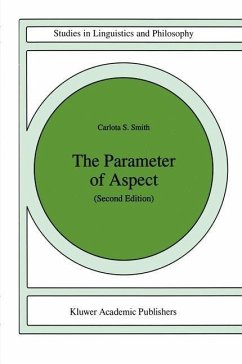
Event Structure and the Left Periphery (eBook, PDF)
Studies on Hungarian
Redaktion: Kiss, Katalin É.
Versandkostenfrei!
Sofort per Download lieferbar
112,95 €
inkl. MwSt.
Weitere Ausgaben:

PAYBACK Punkte
56 °P sammeln!
This book provides substantial new results in a novel field of research examining the syntactic and semantic consequences of event structure. The studies of this volume examine the hypothesis that event structure correlates with word order, the presence or absence of the verbal particle, the [+/- specific] feature of the internal argument, aspect, focusing, negation, and negative quantification, among others. The results reported concern the telicising vs. perfectivizing role of the verbal particle; the syntactic and semantic differences of verbs denoting a delimited change, and those denoting...
This book provides substantial new results in a novel field of research examining the syntactic and semantic consequences of event structure. The studies of this volume examine the hypothesis that event structure correlates with word order, the presence or absence of the verbal particle, the [+/- specific] feature of the internal argument, aspect, focusing, negation, and negative quantification, among others. The results reported concern the telicising vs. perfectivizing role of the verbal particle; the syntactic and semantic differences of verbs denoting a delimited change, and those denoting creation or coming into being; evidence of viewpoint aspect in a language with no morphological viewpoint marking; the aspectual role of non-thematic objects; the source of the 'exhaustive identification' function of structural focus; the interaction of negation and aspect etc.
Dieser Download kann aus rechtlichen Gründen nur mit Rechnungsadresse in A, B, BG, CY, CZ, D, DK, EW, E, FIN, F, GR, HR, H, IRL, I, LT, L, LR, M, NL, PL, P, R, S, SLO, SK ausgeliefert werden.












